Peer Power: The Sit and Chat Club
Warwick. After a period when relationships were often impeded by pandemic quarantine, Warwick Valley High School student Vincent Pinnavaia devised a way to deepen his friendships.
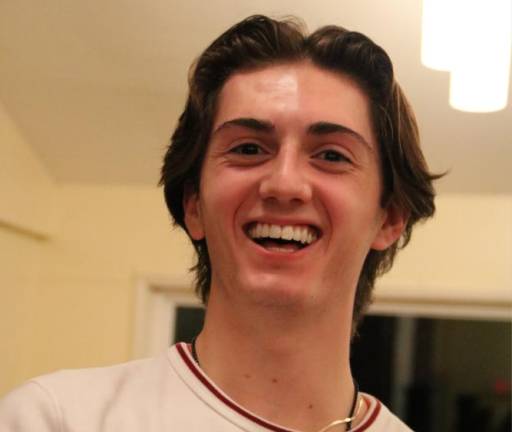
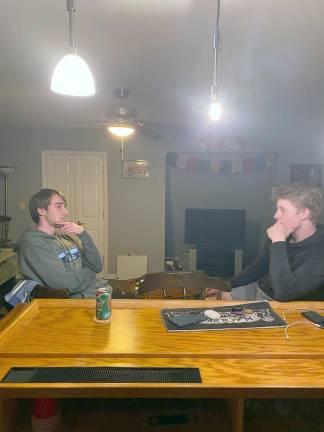
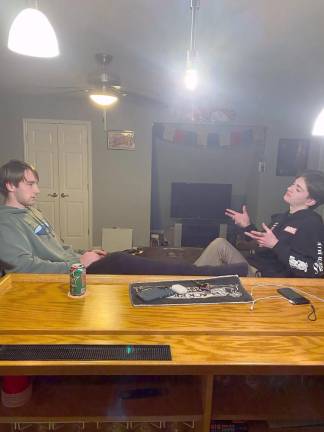
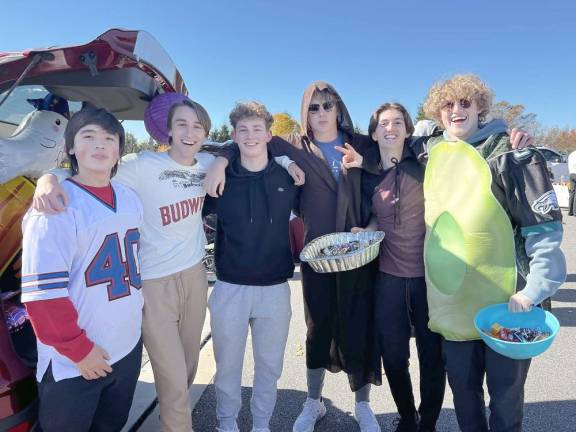
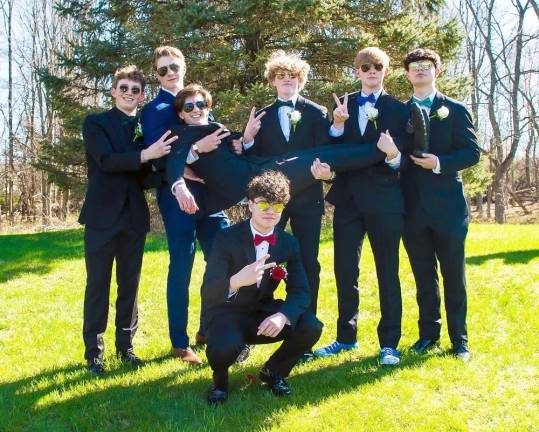
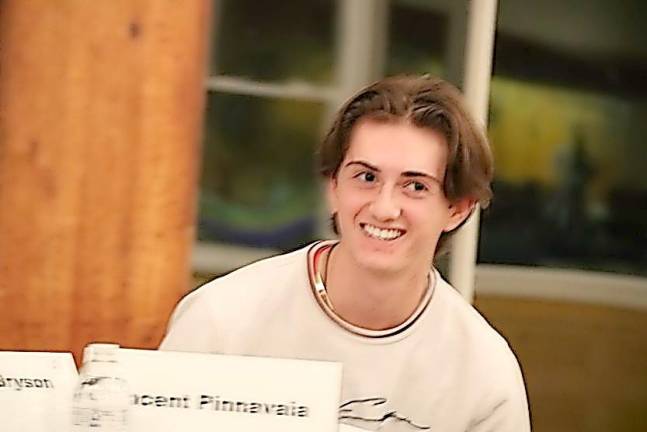
Vincent Pinnavaia, 18, often hangs out with a few friends in his garage, playing foosball and air hockey and listening to music. That was what they were doing one day in December of 2021, as usual, discussing games and gossip, with hip-hop and rap babbling in the background, when Vinnie noticed how bored he was.
“I felt lonely. I wanted to get closer to my friends,” he said. “It’s not that it wasn’t fun, but it was repetitive. If they wanted to talk about something, we would have provided the space. But I wanted to have an experience to get more from the friendship.”
Amid a pandemic of anxiety and depression among teens, as reported by mental health workers, Vinnie strategized to connect. He took a psychology class at school, Warwick Valley High School, and for a class project, he designed a questionnaire for exploring personal values. In January, he met with three friends one at a time and asked them the ten questions, recording responses on his phone.
“It was like calling in a favor,” said Vinnie. “The questions were deep, so we’d have to get closer.”
He asked:
1: What is the purpose of life? What is the purpose of your life?
2: Do you believe in a higher power/a God? If so, what do you do to practice this faith?
3: Do you think people can change? Is there a limit to the change?
4: Do you have a significant other in your life? If so, what would be your last words to them?
5: Would you die for friends? For family?
6: Would you rather be successful with no one, or have so many people that you care for and they care for you, but you are not successful? Is there a limit to that successfulness that determines that answer, or is it relationships over everything?
7: What is one thing you learned in the __ years you have been alive?
8: Are you scared of death?
9: What was your childhood dream? Are there any dreams in your present life that have remnants of it, or has it been forgotten for the sake of “it is what it is” ?
10: If friends / relationships had to have a resume, what would be your go to answer to always get the job?
Vinnie’s friends, like him, are good students, most in the Honor Society. Each question session took about a half hour, and his friends could also ask questions. Two of them did.
“Their answers were similar but unique,” said Vinnie. “Now I know more about them and where they come from about solving things. When I first introduced the questions, they said they had never been asked, and it was cool to have someone want to hear their answers. Many people cover up issues in school.”
His questions had germinated during quarantine, which had meant months without much access to others, and Vinnie had become introspective.
“I was thinking, what do I want? I got into reading for philosophical messages. I like books and messages about pursuing dreams. When we first took off the masks, it was good to see faces and make human connections. We needed to talk to people and grow.”
A probing club has problems at first
The probing exercise led to the idea of a mutually probing group—the Sit & Chat Club, a name inspired by the Sit & Chat Diner that Vinnie’s parents had frequented. They encouraged him to make the group a school club.
At the end of the school year last year, he had three friends involved and, as advisor, Melissa Hamilton, his social studies and psychology teacher. They also had school board certification required for clubs. Then at the high school “club fair,” a crowd signed up.
Vinnie recognized the surge of interest as an effort to add school activities to college applications. But the people who showed up for that first meeting, during a Friday lunch, after the meeting had initially been scheduled for Tuesday, tended to be friends and friends of friends, about a dozen of them. Two thirds were boys. How did that first meeting go?
“It was a train wreck,” said Vinnie.
He and his co-leader had stood in front of the group and led with questions written on the board. “People made jokes. No one took it seriously. There was no vulnerability. I didn’t know how to be serious when everyone was joking,” he said. He deferred to Hamilton, the club advisor.
At first, she said, “Vincent’s friends were willing to support him but not willing to break down boundaries.”
She explained to him that teaching looks easy, but when it looks easy, that’s usually because a class has been carefully planned. She strategized with him.
For the next meeting, rules were established. The meeting would start on time and people would respect each other and listen to the designated speaker. The desks were arranged in a circle, and Vinnie’s role was only to ask a question. One person after another would answer the question.
“I’d generate another question when answers got stale,” Vinnie said.
“They took one topic for 25 minutes, and they were more serious. Feelings were expressed more openly,” said Hamilton. “They might feel uncomfortable, but they could let questions settle before answering. They realized they weren’t alone in their thoughts.”
“If you couldn’t fail, what would your dream be?” was a question that led to, “How would you go about it?” and then “How would you overcome failure?”
Vinnie said he had once wanted to be a musician but decided he didn’t want his future to rely on that. Now he sees himself becoming a psychologist.
They also did some “journaling” about their visions and how to accomplish them. Vinnie finds journaling useful for setting and meeting goals.
“I used to journal daily, but I got distracted with homework,” he said.
“I see students as wanting to connect, and they’re connected on devices but not in each other’s presence. They lack a prefrontal cortex understanding of why they feel this way,” said Hamilton, referring to the part of the brain central to comprehension and problem-solving. “In class they’re hesitant to speak out. They’re relearning connections important to humanity.”
Vinnie agreed, noting his peers’ habits of texting while talking to someone in person. He doesn’t like texting much, but he sometimes finds himself conversing with a headphone funneling music into one ear.
A friend reflects on the club
Vincent’s friend Jackson Mitchell had answered Vinnie’s initial questions and then joined the Sit & Chat Club. He recalled how, after answering the questionnaire, the group of friends had discussed their responses about religion, the afterlife, their dreams and how they’ve changed.
“There’s not much of that kind of talk at school,” said Jackson. “It’s not that we’re not having fun, but this was a deeper conversation that was bonding. It made us closer to talk about deeper issues. Guys don’t talk about anything sometimes. It’s good to get people to open up. They fear being seen as sentimental. We’re creating a place where that’s accepted. Now it’s easier to talk about my issues and ask people what’s going on with them.”
The club has a public moment
Club members decided to collaborate with the community group We the People Warwick for help promoting the club, while the club would help generate interest in We the People youth activities among their peers, including an essay contest, art exhibit and a youth survey.
Youth mental health issues have been a concern of WTPW, as articulated by several experts at the group’s recent Mental Health Forum, where Vinnie appeared as a speaker on November 10. Mental health professionals, including representatives from the school district, local hospitals and the Orange County Youth Bureau all described the surging need for and lack of enough mental health assistance for youth.
Michael Bark, from the Youth Bureau, asserted the value of peer support under these conditions. Then, the last to speak, Vincent agreed with him and described the Sit & Chat group.
“It’s a place to talk about topics you usually don’t talk about with friends. You might not need a therapist, just a friend to talk to or help you talk,” he said.
How have Vinnie’s friendships been affected by his effort at a deeper dive? They still get together in his garage to play foosball and air hockey, listen to music and gossip, but the foundations of the friendships feel deeper now, he said.
When I first introduced the questions, they said they had never been asked, and it was cool to have someone want to hear their answers. Many people cover up issues in school.- Vincent Pinnavaia
It’s not that we’re not having fun, but this was a deeper conversation that was bonding. It made us closer to talk about deeper issues. Guys don’t talk about anything sometimes. It’s good to get people to open up. They fear being seen as sentimental. We’re creating a place where that’s accepted. Now it’s easier to talk about my issues and ask people what’s going on with them. - Jackson Mitchell